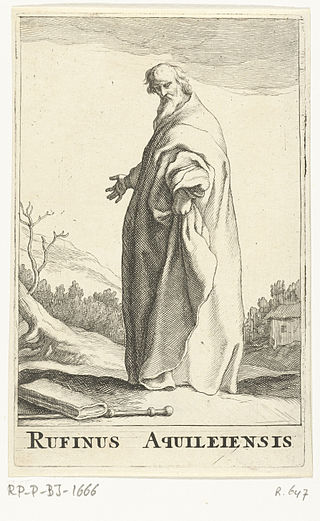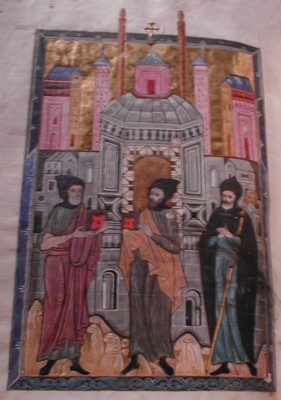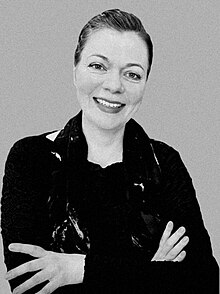
Origen of Alexandria, also known as Origen Adamantius, was an early Christian scholar, ascetic, and theologian who was born and spent the first half of his career in Alexandria. He was a prolific writer who wrote roughly 2,000 treatises in multiple branches of theology, including textual criticism, biblical exegesis and hermeneutics, homiletics, and spirituality. He was one of the most influential and controversial figures in early Christian theology, apologetics, and asceticism. He has been described by John Anthony McGuckin as "the greatest genius the early church ever produced".

Didymus the Blind was a Christian theologian in the Church of Alexandria, where he taught for about half a century. He was a student of Origen, and, after the Second Council of Constantinople condemned Origen, Didymus's works were not copied. Many of his writings are lost, but some of his commentaries and essays survive. He was seen as intelligent and a good teacher.
Christian philosophy includes all philosophy carried out by Christians, or in relation to the religion of Christianity. Christian philosophy emerged with the aim of reconciling science and faith, starting from natural rational explanations with the help of Christian revelation. Several thinkers such as Origen of Alexandria and Augustine believed that there was a harmonious relationship between science and faith, others such as Tertullian claimed that there was contradiction and others tried to differentiate them.

The Epistle of Barnabas is an early Christian Greek epistle written between AD 70 and AD 135. The complete text is preserved in the 4th-century Codex Sinaiticus, where it appears at the end of the New Testament, following the Book of Revelation and before the Shepherd of Hermas. For several centuries, it was one of the "antilegomena" ("disputed") writings that some Christians looked at as sacred scripture, while others excluded them. Eusebius of Caesarea classified it with excluded texts. It is mentioned in a perhaps third-century list in the sixth-century Codex Claromontanus and in the later Stichometry of Nicephorus appended to the ninth-century Chronography of Nikephoros I of Constantinople. Some early Fathers of the Church ascribed it to the Barnabas mentioned in the Acts of the Apostles, but it is now generally attributed to an otherwise unknown early Christian teacher. It is distinct from the Gospel of Barnabas.
In theology, apokatastasis is the restoration of creation to a condition of perfection. In Christianity, the term refers to a form of Christian universalism, often associated with Origen, that includes the ultimate salvation of everyone—including the damned and the Devil. The New Testament speaks of the "apokatastasis of all things," although this passage is not usually understood to teach universal salvation. The dogmatic status of apokatastasis is disputed, and some orthodox fathers such as Gregory of Nyssa taught apokatastasis and were never condemned.

The Gospel of the Hebrews, or Gospel according to the Hebrews, is a lost Jewish–Christian gospel. The text of the gospel is lost, with only fragments of it surviving as brief quotations by the early Church Fathers and in apocryphal writings. The fragments contain traditions of Jesus' pre-existence, incarnation, baptism, and probably of his temptation, along with some of his sayings. Distinctive features include a Christology characterized by the belief that the Holy Spirit is Jesus' Divine Mother and a first resurrection appearance to James, the brother of Jesus, showing high regard for James as the leader of the Jewish Christian church in Jerusalem. It was probably composed in Greek in the first decades of the 2nd century and is believed to have been used by Greek-speaking Jewish Christians in Egypt during that century.

Tyrannius Rufinus, also called Rufinus of Aquileia, was an early Christian monk, philosopher, historian, and theologian who worked to translate Greek patristic material, especially the work of Origen, into Latin.
Babai the Great was an early church father of the Church of the East. He set several of the foundational pillars of the Church, revived the monastic movement, and formulated its Christology in a systematic way. He served as a monastic visitor and coadjutor with Mar Aba as unofficial heads of the Church of the East after Catholicos Gregory until 628 AD, leaving a legacy of strong discipline and deep religious Orthodoxy. He is revered in the modern Assyrian Church of the East and Ancient Church of the East.

Melania the Elder, Latin Melania Maior was a Desert Mother who was an influential figure in the Christian ascetic movement that sprang up in the generation after the Emperor Constantine made Christianity a legal religion of the Roman Empire. She was a contemporary of, and well known to, Abba Macarius and other Desert Fathers in Egypt, Jerome, Augustine of Hippo, Paulinus of Nola, and Evagrius of Pontus, and she founded two religious communities on the Mount of Olives in Jerusalem. She stands out for the convent she founded for herself and the monastery she established in honour of Rufinus of Aquileia, which belongs to the earliest Christian communities, and because she promoted the asceticism which she, as a follower of Origen, considered indispensable for salvation.

MF Norwegian School of Theology, Religion and Society is a Norwegian private specialized university. MF focuses on education, research and dissemination of their fields of expertise. The specialized university is located at Majorstuen in Oslo.

Evagrius Ponticus, also called Evagrius the Solitary, was a Christian monk and ascetic from Heraclea, a city on the coast of Bithynia in Asia Minor. One of the most influential theologians in the late fourth-century church, he was well known as a thinker, polished speaker, and gifted writer. He left a promising ecclesiastical career in Constantinople and traveled to Jerusalem, where in 383 AD he became a monk at the monastery of Rufinus and Melania the Elder. He then went to Egypt and spent the remaining years of his life in Nitria and Kellia, marked by years of asceticism and writing. He was a disciple of several influential contemporary church leaders, including Basil of Caesarea, Gregory of Nazianzus, and Macarius of Egypt. He was a teacher of others, including John Cassian and Palladius of Galatia.
African theology is Christian theology from the perspective of the African cultural context. It should be distinguished from black theology, which originated from the American and South African context and is more closely aligned with liberation theology. Although there are ancient Christian traditions on the African continent, during the modern period Christianity in Africa was significantly influenced by western forms of Christianity brought about by European colonization.

The Catechetical School of Alexandria was a school of Christian theologians and bishops and deacons in Alexandria. The teachers and students of the school were influential in many of the early theological controversies of the Christian church. It was one of the two major centers of the study of biblical exegesis and theology during Late Antiquity, the other being the School of Antioch.

The Jewish–Christian Gospels were gospels of a Jewish Christian character quoted by Clement of Alexandria, Origen, Eusebius, Epiphanius, Jerome and probably Didymus the Blind. All five call the gospel they know the "Gospel of the Hebrews", but most modern scholars have concluded that the five early church historians are not quoting the same work. As none of the works survive to this day, attempts have been made to reconstruct them from the references in the Church Fathers. The majority of scholars believe that there existed one gospel in Aramaic/Hebrew and at least two in Greek, although a minority argue that there were only two, in Aramaic/Hebrew and in Greek.
Gorazd Kocijančič is a freelance Slovene philosopher, poet and translator. Kocijančič is well known for his translation of the entire corpus of Plato's work into Slovene.

Elizabeth Ann Clark was a professor of the John Carlisle Kilgo professorship of religion at Duke University. She was notable for her work in the field of Patristics, and the teaching of ancient Christianity in US higher education. Clark expanded the study of early Christianity and was a strong advocate for women, pioneering the application of modern theories such as feminist theory, social network theory, and literary criticism to ancient sources.

Ilaria L. E. Ramelli is an Italian-born historian, academic author, and university professor who specializes in ancient, late antique, and early mediaeval philosophy and theology.

The Origenist crises or Origenist controversies were two major theological controversies in early Christianity involving the teachings of followers of the third-century Alexandrian theologian Origen.
There are no original works of philosophy in the Coptic language. All surviving philosophical passages in Coptic are of Greek origin and many are anonymous. Mostly they deal with ethics and are treated like wisdom literature. Only a few texts have been edited and published.
Gregory E. Sterling is an American religious scholar, academic and researcher. He is the Reverend Henry L. Slack Dean and Lillian Claus Professor of New Testament at Yale Divinity School. He is a former dean of the Graduate School of University of Notre Dame where he also served on the faculty for 23 years.










